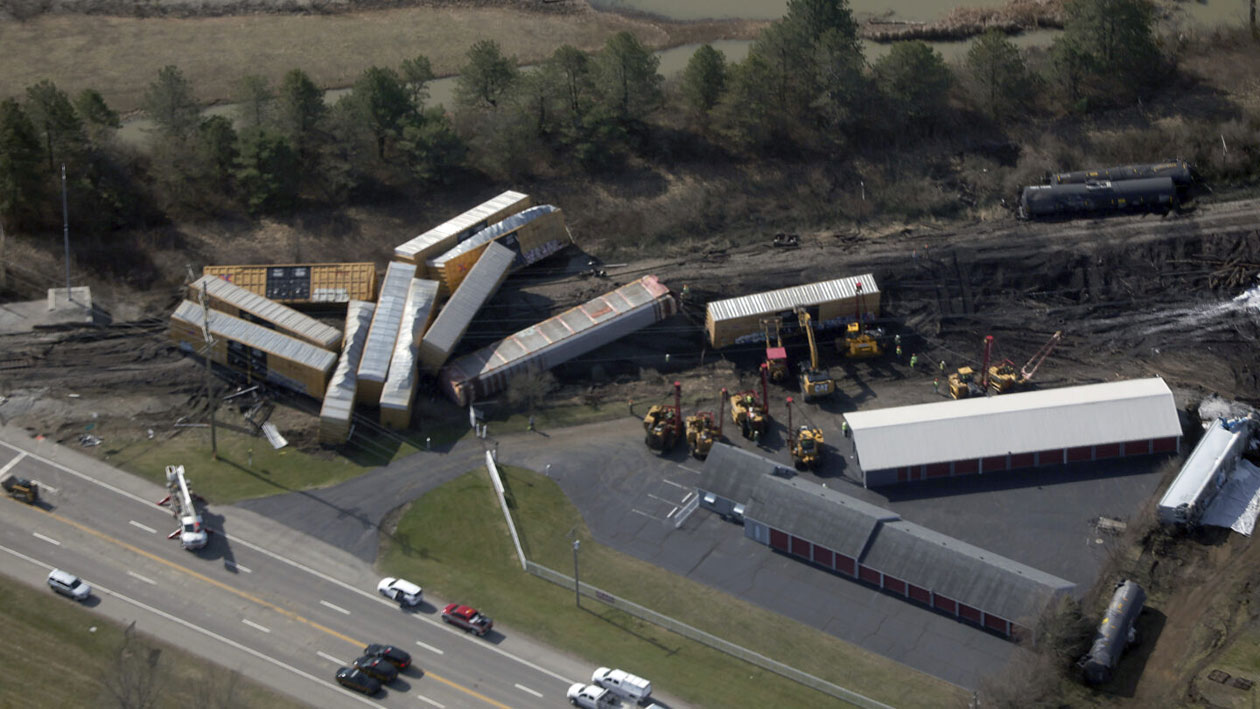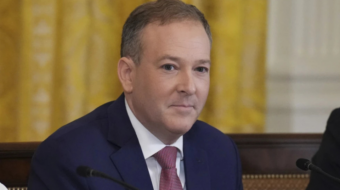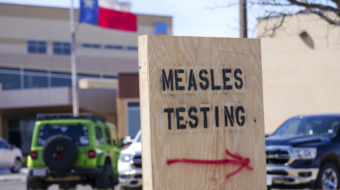
EAST PALESTINE, Ohio—The unionized workers cleaning up the mess from chemicals released by Norfolk Southern’s giant freight train wreck in East Palestine, Ohio, on Feb. 3 are getting sick. But when they complained about nausea, migraine headaches, and lack of personal protective equipment (PPE) to their immediate bosses at the wreck site, they got the brushoff.
So the 39 workers, members of the Brotherhood of Maintenance of Way Engineers, a Teamsters sector, called in a top Teamsters rail safety official to bring them justice and bring Norfolk Southern to heel.
And that official, Jonathon Long, chairman of the American Rail System Federation/ Teamsters, has in turn raised hell about what’s happening to his workers in a scathing letter to Ohio Republican Gov. Mike DeWine.
Long, a 28-year BMWE member who also works for Norfolk Southern, demands DeWine not only order the big railroad to clean up its act and protect its workers—rather than its profits—but also that DeWine lobby “for rule-making and regulatory reform” affecting the railroads and against the dangerous working conditions NS and other big freight railroads have created in the first place.
No sooner had Long written to DeWine on March 1 than a second Norfolk Southern freight train wrecked, on March 5, in Springfield, Ohio, 40 miles west of Columbus. That freight, headed for Alabama, had no hazardous chemicals, state environmental officials said. Still, as a precaution, they issued a shelter-in-place order for 10 hours to homeowners near that wreck.
The track workers’ illnesses are the latest development in the month-long and continuing saga of ramifications from the wreck, which saw dozens of cars, including tanker cars filled with dangerous chemicals, derail in the small Ohio town a quarter of a mile away from the Pennsylvania border and midway between Youngstown and the Ohio River.
The workers, members of the Brotherhood of Maintenance of Way Employees/ Teamsters, suffer nausea and migraine headaches from toiling in the area without proper personal protective equipment (PPE), respirators, rubber gloves, overboots, and hazmat suits. When they sought PPE from Norfolk Southern supervisors, they were ignored.
“One worker shared with me that he called his supervisor and requested to be transported off the derailment site due to the concerns about his safety caused by exposure to the chemicals that were causing him nausea and migraines,” Long wrote. “He never heard back.”
Before writing to DeWine, Long had also raised the issue with Norfolk Southern executives of workers falling ill. The execs ignored that problem and instead proposed a deal, Long wrote to DeWine: We’ll trade you—the union–what you want, paid sick and family leave, if you support our proposal for automated train inspections, with no human involvement.
“It was an underhanded attempt to further raise their profits” under the big freight railroads’ “cost-cutting business model,” Precision Scheduled Railroading (PSR), Long told DeWine. He attached the railroad’s proposal to his letter, blacking out the union recipients.
In contentious contract talks last year, Norfolk Southern and the six other big Class I freight railroads absolutely refused to discuss paid sick and family leave, or the onerous and erratic schedules they force on their 115,000 unionized workers.
And when Congress and Democratic President Joe Biden stepped in and imposed a new contract on the workers, it didn’t include paid sick and family leave, either. Nor did it curb the railroads’ scheduling practices.
The freight railroads began implementing PSR in 2015, over protests and opposition from rank-and-file workers and the nation’s 14 rail unions. PSR let them cut costs by cutting people, lengthening trains and making them heavier, putting rail cars transporting hazardous materials in vulnerable positions, not strengthening those cars against leaks and explosions, and reducing inspections and maintenance—all to increase profits and satisfy their Wall Street financiers.
PSR also produced conditions that led to the East Palestine wreck, and to the dangers to that community, the surrounding areas, and to the track maintenance workers, Long wrote.
“They gamble with your money, and you hold all the risk if they lose by putting a toxic train in the ditch in your community,” Long wrote.
“NS and the other railroads must be stopped from their cost-cutting business model,” which unions note have cut railroad employment by 30% since 2015, “and start focusing on how they can improve their performance to be as safe as possible.”
Congress is getting involved, too. The Senate Environment and Public Works Committee has tentatively scheduled a March 9 hearing on the wreck, and Norfolk Southern CEO Alan Shaw voluntarily agreed to testify, particularly about the toxic chemicals it released. U.S. EPA Administrator and Ohio’s EPA chief jointly replied to Ohio’s two senators that their agencies are monitoring the East Palestine wreck site to prevent dioxin releases.
The East Palestine wreck is affecting other states besides Ohio and nearby Pennsylvania.
That’s because the Ohio Environmental Protection Agency reports solid waste and wastewater is being shipped beyond the state’s borders. The Ohio EPA said 2.7 million gallons of liquid wastewater is being shipped to Vickery, Ohio, Deer Park, Texas and Romulus, Mich. And 1,970 tons of solid waste to Grafton and East Liverpool, Ohio, Belleville, Mich., and North Roachdale, Ind. Local media in Indiana reported that the town’s residents demanded answers from officials about the risk they face.
And the Senate Commerce, Science and Transportation Committee sent a long letter to railroad CEO Alan Shaw, seeking documents and records about its safety measures and PSR. Panel chair Sen. Maria Cantwell, D-Wash., said the wreck raises the same troubling questions Long did. The railroad’s CEO will voluntarily testify to the panel on March 9 about the wreck.
“The American people should hear from Norfolk Southern CEO precisely why they thought it was a good idea to spend years lobbying to loosen regulations designed to prevent accidents like this,” Majority Leader Charles Schumer, D-N.Y., said in a floor speech in early March. “I especially want to hear why Norfolk Southern, after seeing a record $3.3 billion in profits last year, prioritized billions in stock buybacks instead of putting that money towards safety and towards their workers.”
The New Testament “tells of the perils when you put money above all,” Long concluded in his letter to DeWine. Norfolk Southern has done so “and left communities like East Palestine, and the workers, with many sorrows. This is immoral, and it all occurs because of the railroad’s cost-cutting business model that disregards the sanctity of human life for the sake of more record profits.”










